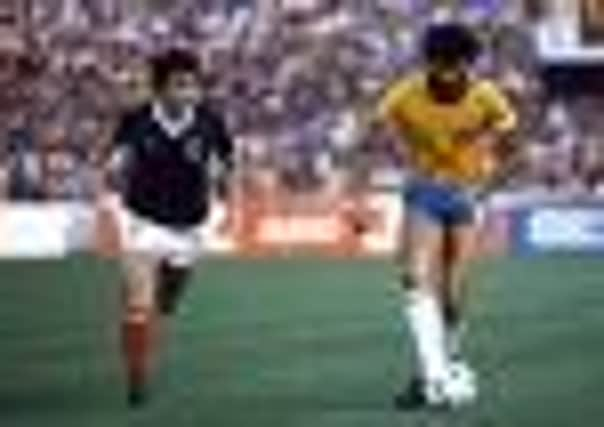Farewell to ‘genius’ Dr Socrates


A smoker and drinker even in his playing days, Socrates had been on a life support system in hospital in Sao Paulo since Thursday when he was admitted suffering from food poisoning. He died of septic shock.
Socrates, who had a degree in medicine and was known at the height of his fame as “Dr Socrates”, had been taken to hospital three times since August, when he spent nine days there due to a digestive haemorrhage caused by excessive drinking.
Advertisement
Hide AdAdvertisement
Hide AdThe former attacking midfielder played for Brazil at the 1982 and 1986 World Cups.
He was also named in World Soccer’s top 100 players of all-time and was put up as one of compatriot Pele’s 125 greatest-ever players.
His brother Rai succeeded where Socrates failed, winning the World Cup with Brazil in 1994.
Bearded, thin, and popularly known as “Magrao”, or the Big Skinny One, Socrates was part of a golden Brazilian generation that included midfielder Zico, Junior, Falcao and Eder. Socrates is best remembered for his appearances at the 1982 and 1986 World Cups, playing in the former against Scotland, and helping his side to a 4-1 win over Jock Stein’s team, who had led through David Narey’s goal.
The swashbuckling “Selecao” had been expected to go on and lift the trophy in Spain but came unstuck in a dramatic second stage clash with Italy, who knocked Brazil out 3-2 thanks to a Paulo Rossi hat-trick in what is regarded as one of the best World Cup matches yet.
Brazil had twice come from behind, the first time through Socrates, but Rossi’s third goal in the 75th minute proved too much for one of the greatest collection of players never to win the World Cup.
An astute passer and reader of the game, he earned his nickname of the Golden Heel with a uniquely nonchalant playing style, using the backheel to telling effect and scoring memorable goals with both feet.
His languid penalty-taking style, eschewing the traditional run-up to merely step up to the ball and lift it into the net, backfired at the 1986 World Cup where Brazil lost to France in the quarter-finals on penalties after one of his lazy efforts was saved.
Advertisement
Hide AdAdvertisement
Hide Ad“Whoever shared life with him enjoyed the special person he was, intelligent, cultured, fun, a ball ace. He’s the kind of figure hard to find in football,” said his former Brazil team-mate, Junior.
Socrates started out at Botafogo-Ribeirao Preto, where he became their top player despite also studying at university.
He joined Sao Paulo club Corinthians in 1978 and stayed for six years.
Corinthians, who clinched the league championship last night, said: “Today, which should be only a day of joy as the ‘Brasileirao’ is settled, started sadly for Brazilian football, mainly for Corinthian [fans]. [We] say goodbye to Magrao with sadness but we also remain grateful for the honour of having seen one of the greatest players in football wearing the white-and-black shirt in so many games.
“Thank you for the beautiful goals, touches of genius, majestic football only Socrates played.”
Former Brazil coach Carlos Alberto Parreira, who trained Socrates with the national team in 1983-84, said: “He was the most intellectual of the players I worked with, intelligent, objective and he had opinions that were his own and firm about anything and mainly politics.
“He was a genius on the field. He marked a generation with the technical quality and intelligence of his football … He was one of the great icons of that [1982] team that marvelled the world.”